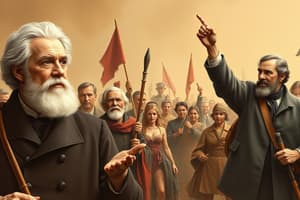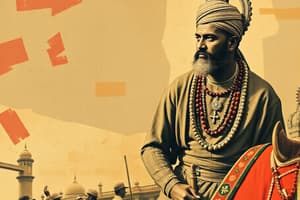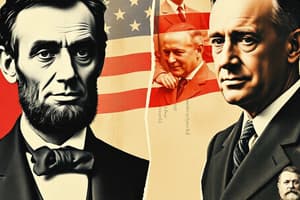Podcast
Questions and Answers
What is the primary role of a village head in a rural community?
What is the primary role of a village head in a rural community?
- Teaching children in the village
- Managing international relations
- Performing medical surgeries
- Collecting taxes from villagers (correct)
Which of the following is a responsibility of a village head as described in the text?
Which of the following is a responsibility of a village head as described in the text?
- Maintaining a personal garden
- Running a local bakery
- Entertaining tourists
- Supervising public works projects (correct)
In what way has modernity affected traditional titles like village head?
In what way has modernity affected traditional titles like village head?
- Decreased their responsibilities
- Increased their power and authority
- Led to the elimination of such titles (correct)
- Encouraged more people to aspire to these titles
What is a common characteristic of leaders holding titles like village head according to the text?
What is a common characteristic of leaders holding titles like village head according to the text?
How important is the role of a village head in society according to the text?
How important is the role of a village head in society according to the text?
What is a 'title holder' primarily known for?
What is a 'title holder' primarily known for?
Which of the following best describes a 'district head'?
Which of the following best describes a 'district head'?
What role did the 'village head' traditionally play in communities?
What role did the 'village head' traditionally play in communities?
In what way does a 'district head' differ from a 'title holder'?
In what way does a 'district head' differ from a 'title holder'?
Which best defines the primary difference between a district head and a village head?
Which best defines the primary difference between a district head and a village head?
Flashcards are hidden until you start studying
Study Notes
Throughout history, individuals have been given various titles associated with leadership roles within their communities. These positions often come with significant responsibilities and influence over local affairs. Some of these titles include 'title holder,' 'district head,' and 'village head.' Each role has its own unique set of duties and powers, which can vary greatly depending on the culture, time period, and location they're found in.
A title holder is someone who holds a position, usually one related to social status or honor, such as a duke or an empress. This person typically exercises considerable power and authority in society; however, the specific rights granted to them may differ according to customs and circumstances. In many cases, the individual granted this title will also serve as a leader of some kind—perhaps ruling over a large region or acting as a representative of a particular group or institution.
The district head, meanwhile, is a person designated to lead a smaller area than what would be considered a nation or state. Districts were common administrative units during pre-modern times, when states tended to be larger, more unwieldy entities—so the district head was essentially a regional governor of sorts, responsible for managing issues specific to his or her geographic domain. For example, during the Han dynasty, each city had its own chief official called a magistrate, while the chief officials of counties were known as county heads.
Lastly, we have the village head. A village head is traditionally the most powerful figure in a rural community, although modern variations may have lessened this strict hierarchical structure somewhat. As the name suggests, a village head would typically manage all matters relating to the day-to-day life of villagers in a small settlement. He or she might collect taxes from residents, adjudicate disputes among neighbors, supervise public works projects like road construction or bridge building, and generally represent the interests of village residents vis-à-vis higher authorities.
In conclusion, throughout history, people have held numerous important titles reflecting their standing in a society. While some of these titles remain in place today, others have fallen into disuse due to changes brought by modernity. However, regardless of how much things change, it remains true that leaders must continue to exercise responsibility and authority if societies are going to thrive and function well. Whether you call him a title holder, a district head, or even just a plain old village head, he is still a vital part of our human story.
Studying That Suits You
Use AI to generate personalized quizzes and flashcards to suit your learning preferences.




